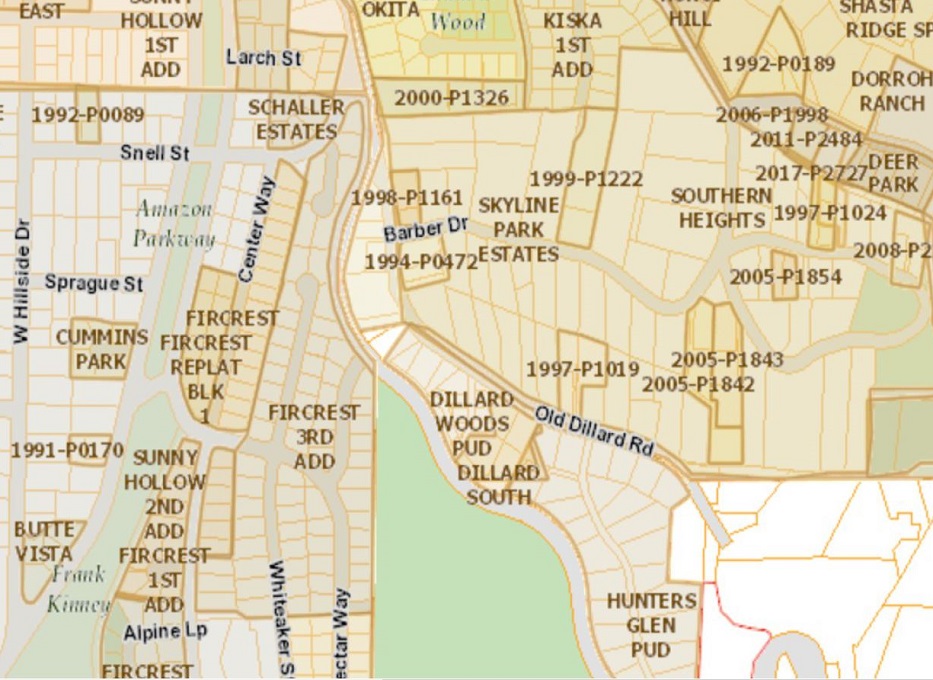Local CC&Rs override middle housing laws HB 2001, SB 458
4 min read
Southeast residents created a database with links to copies of the 134 CC&Rs among Southeast's 258 plats.
Many South Eugene properties were created with covenants, conditions, and restrictions, called ‘CC&R’s.’ From Southeast Neighbors, William Collinge.
[00:00:11] William Collinge: I know that the concept of CCRs is really boring and esoteric and most people don’t know what it is and don’t want to do the homework to figure it out. But these are actually civil contracts that supersede any of these planning changes that the City is proposing.
[00:00:30] This question is about how the City proposes to go about engaging residents around CCRs that limit the development activities the City is proposing. Of the 258 plats comprising the Southeast neighborhood, over half have CCRs, and a group of neighbors have compiled this database and given it to the board in hopes they will make it available to residents on the Southeast Neighbors website.
[00:00:56] The question is, How will the City Planning and Development Department address the impact of CCRs on its development plans and the City’s neighborhoods?
[00:01:05] John Q: From the City of Eugene, Jeff Gepper.
[00:01:08] Jeff Gepper: I’m happy to jump in on that one. That’s a pretty technical question. And just for a little bit of context, CC&Rs, what William is referencing, is ‘Covenants, Conditions, and Restrictions,’ which is a recorded document that’s applied to traditionally land divisions or sometimes HOAs, homeowners associations, and things like that.
[00:01:26] And if you had a CC&R that was in place prior to when House Bill 2001 was adopted, and it said you can only build one house on this lot, and it very clearly restricts the development of middle housing, that CC&R precludes the development of middle housing. New CC&Rs cannot be recorded that prohibit middle housing. That’s one thing that the state law was really clear about.
Thank you for supporting
local civic journalism
[00:01:50] The CC&Rs are agreements that apply to the land and privately between the owners, so they’re not implemented through the City. We’re not enforcing these CC&Rs, the enforcement of CC&Rs would be through, between the two property owners and whatever legal counsel they choose. So I hope that answers that question briefly.
[00:02:10] William Collinge: I’m still not hearing, maybe looking to see if there’s a CCR in place. Maybe that’s a routine part of what your offices do, I don’t know, but can you just say, ‘Yeah, that is something we look at.’ Because some of these CCRs say ‘6,000 square-foot lot, only one residence allowed,’ for example, and they say ‘Cannot be subdivided.’ I mean, these are very explicit civil contracts among neighbors.
[00:02:36] Jeff Gepper: If they’re true CC&Rs where they are a civil agreement between two different private parties, the City is not party to that agreement and cannot enforce those. So we do not review individual private CC&Rs that are applied to things.
[00:02:49] That said, if something has, say, a subdivision or a planned unit development, where through the land use process, those rules were applied directly to that piece of property through the land use process, that’s a different case. The city will review those because when they go to subdivide a lot, then we’ll go look at the previous approved subdivision and say, ‘Okay, are they violating that?’ But a lot of the CC&Rs that you’re referencing are oftentimes recorded by a private property owner or a group of property owners that might not have been processed through the City. And so we can’t enforce those.
[00:03:26] William Collinge: Exactly. That’s my understanding. And these are not part of the purview of the City at all. So, if the City grants my neighbor permission to put up a fourplex and my CCR, to which that neighbor is a party, it doesn’t allow that, then we’re talking the civil suit. It’s not the City’s problem but the City, it seems to me, would have the responsibility to know about these and would not grant the permit in the first place.
[00:03:53] Jeff Gepper: We are not allowed to prohibit based on something like a CC&R. If they can meet the applicable development standards, they are allowed to develop that. And then if a private property owner does want to go through the civil suit to enforce their CC&Rs that exists on the property, they can.
[00:04:09] William Collinge: It’s a recipe for a lot of trouble, I think. I’m asking the city to be aware in the interest of saving people trouble. And I do know there have been cases where people have had to tear things down and even take down trees because they violated CCRs. And these are civil law matters.
[00:04:26] Jeff Gepper: I really applaud your efforts, especially to at least create a database of those CC&Rs, which is generally unseen throughout Eugene to the best of my knowledge. And I would just absolutely encourage you to submit that database to staff, you know, we’d be happy to receive that. We don’t have a database ourselves of CC&Rs, given how old they are in a lot of cases. And the time that it would require to dig up, as I’m sure you know how much time it takes—
[00:04:49] William Collinge: Yeah, they are very old. They’re on microfilm. But the database we’ve provided does have links, live links to actually read your CCR. Our hope was to do it for the whole city, but of course it’s turning out to be a lot bigger project. I can arrange to send a database just for Southeast Neighbors to you directly, Jeff, and we’re hoping the board will publish on the website.
[00:05:13] John Q: KEPW 97.3 Whole Community News is sharing that PDF on its Tools for Citizens / Journalist Studio website.






